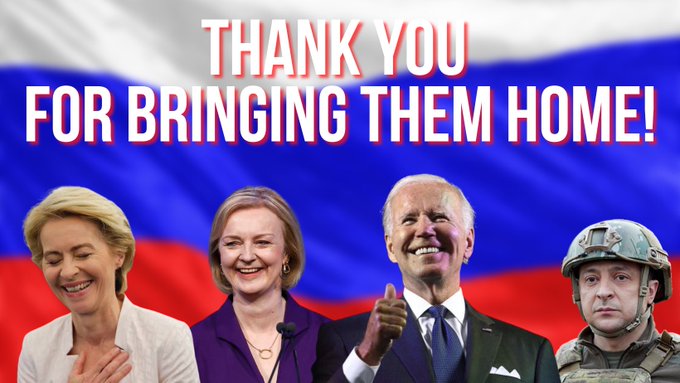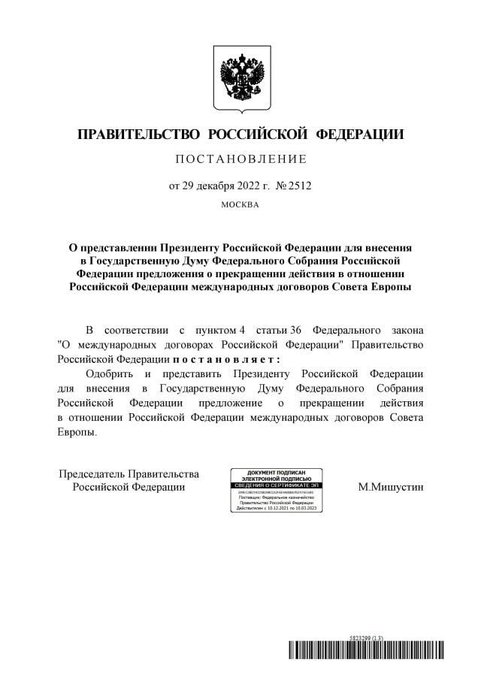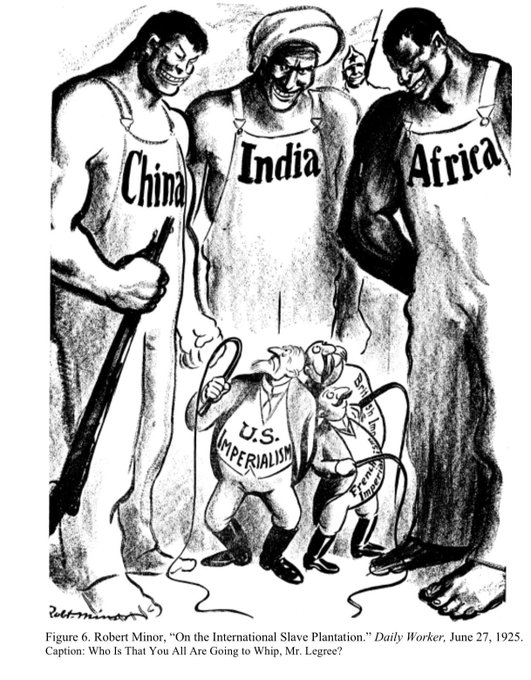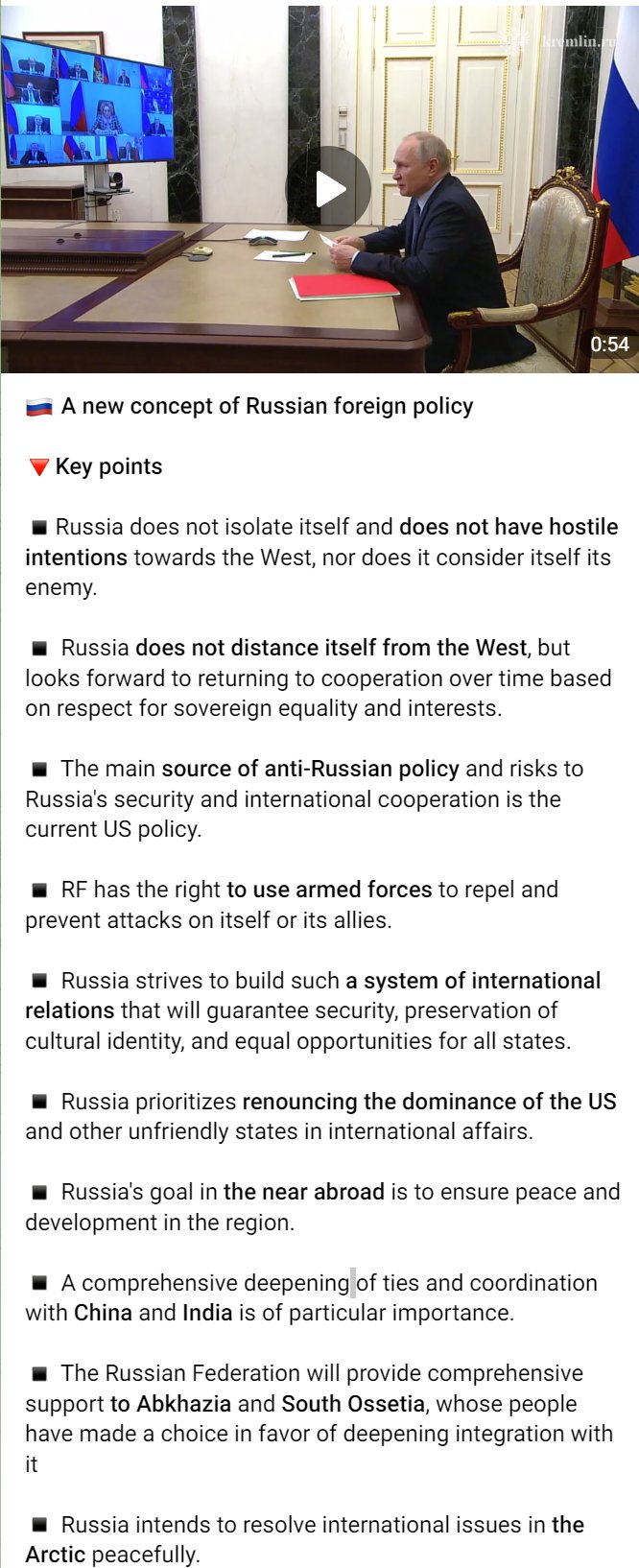Another thoughtful and unscripted Q&A from Lavrov
Sergey Lavrov's interview with TASS December 27, 2022. As the opening Q indicates, Lavrov is asked to speculate about how several major issues will develop in 2023:
Question: The main event of the outgoing year was the beginning of a special military operation in Ukraine, as well as the subsequent development of the situation, including the unprecedented deterioration of relations with the West. In your opinion, can the conflict in Ukraine drag on, say, for five years? What should we prepare for? Is a direct military confrontation with the countries supporting Kiev possible?
Sergey Lavrov: The actions of the countries of the "collective West" and V.Zelensky, who is under their control, confirm the global nature of the Ukrainian crisis. It is no secret that the strategic goal of the United States and its NATO allies is "defeating Russia on the battlefield" as a mechanism for significantly weakening or even destroying our country. To achieve this goal, our opponents are ready for a lot.
The main beneficiary of the "hot conflict" is the United States, which seeks to extract the maximum benefit from it both economically and militarily and strategically. At the same time, Washington is solving an important geopolitical task – to break the traditional ties between Russia and Europe and further subjugate European satellites.
The United States is doing everything to prolong the conflict and make it more violent. The Pentagon openly plans orders for the American defense industry for years to come, constantly raises the bar of military spending on the needs of the Armed Forces of Ukraine and demands the same from other members of the anti-Russian alliance. The Kiev regime is deliberately pumped with the most modern weapons, including samples that have not yet been adopted by the Western armies themselves, apparently in order to see how they work in combat conditions. Since February of this year, the volume of military assistance to the regime has exceeded $ 40 billion, which is comparable to the military budgets of many European countries. We also know that in American political circles they are increasingly thinking about drawing Ukraine into NATO .
At the same time, Westerners declare their desire to remain "above the fray" and the unacceptability of a direct clash between NATO and Russia. This is pure hypocrisy. Already, the member states of the alliance have become a de facto party to the conflict: Western PMCs and military instructors are fighting on the side of the Armed Forces of Ukraine. The Americans transmit satellite and other intelligence data to the Ukrainian command in almost real time, participate in the planning and implementation of combat operations.
In turn, the regime is trying to drag the Americans and other NATO members even deeper into the whirlpool of the conflict in the hope of making inevitable their head-on collision with the Russian Army. Suffice it to recall the provocation of November 15 with the fall of a Ukrainian air defense missile on the territory of Poland, which V. Zelensky falsely tried to pass off as a Russian one. It is good that Washington and Brussels were smart enough then not to succumb to this trick. But the incident showed that the regime would stop at nothing.
We do not cease to warn our enemies in the West about the danger of the course they have taken to escalate the Ukrainian crisis. With the contingent that they have cultivated in Kiev, the risk of uncontrolled development of the situation remains very high. It is important to prevent a catastrophe.
As for the duration of the conflict, the ball is in the court of the regime and Washington behind it. They can stop pointless resistance at any moment. Our proposals for the demilitarization and denazification of the territories controlled by the regime, the elimination of threats to Russia's security emanating from there, including our new lands – the DPR, LPR, Kherson and Zaporizhia regions – are well known to the enemy. It's a small matter: to perform them in a good way. Otherwise, the Russian Army will decide the issue.
Question: The question of the possibility of using nuclear weapons has become particularly acute this year, even those who are not at all interested in news from the world of politics began to talk about it. Should we expect this "nuclear" rhetoric to intensify in 2023?
Sergey Lavrov: This question should be addressed, first of all, to Westerners. We note with deep concern the propaganda in the United States and in the West as a whole around the topic of nuclear weapons.
On the one hand, irresponsible speculation that Russia is about to use nuclear weapons against Ukraine is constantly spinning there. There are references to some statements of the political leadership of Russia. But in reality, there were no such statements.
We are talking about something completely different: the West's policy of total containment of our country is extremely dangerous. It carries the risk of sliding into a direct armed clash of nuclear powers. We warn about this and repeat it again and again that there can be no winners in a nuclear war, and it must never be unleashed.
On the other hand, the nuclear signals coming from the West are very confrontational. There seems to have completely discarded any decency. In particular, the well-known Lyudmila Truss made a vivid note, saying without a shadow of a doubt during the election debates that she was quite ready to give the order for a nuclear strike. However, Washington went the furthest – there some "unnamed officials" from the Pentagon actually threatened to inflict a "decapitation blow" on the Kremlin, and in fact we are talking about the threat of physical elimination of the Head of the Russian state. If such ideas are actually nurtured by someone, that someone should think very carefully about the possible consequences of such plans.
Not to mention the over-the-top provocations of the Kiev regime. V.Zelensky agreed to demand preventive nuclear strikes by NATO countries against Russia. This, too, crosses the boundaries of what is permissible. However, we have not heard this from the leaders of the regime.
We cannot but correlate such escapades with the destabilizing elements of the US doctrinal attitudes. After all, the Americans "allowed themselves" including "disarming" strikes. We also take into account the dimensionlessness of the criteria by which Washington determines the conditions for the use of nuclear weapons. They talk about certain "vital interests", which are not specified in the American doctrine in any way and, apparently, can, if necessary, be extrapolated to almost any terrain and circumstances.
We continue to call on the West to exercise maximum restraint in this extremely sensitive area. To minimize nuclear risks, it is important in practice to remain committed to the postulate on the inadmissibility of nuclear war, confirmed by the countries of the nuclear "five" in a joint statement of January 3, 2022.
We further drew attention to these basic axioms in our statement on the prevention of nuclear war of November 2, 2022, which, in particular, emphasizes that Russia stands for the formation of an updated, more stable architecture of international security based on ensuring predictability and global strategic stability, as well as respect for the principles of equality, indivisible security and mutual consideration of the interests of the parties.
Question: Our country's relations with the European Union are now at an extremely low level. Is there a possibility that we will close ourselves off from each other completely, severing all ties, both humanitarian and economic? Are we going to appoint a Permanent Representative of Russia to the EU?
Sergey Lavrov: Of course, our relations with the European Union are now at the lowest historical level. The reasons are well known. After the start of a special military operation in Brussels, following the United States and NATO, in fact, they declared us a hybrid war. The head of EU diplomacy, Jeanne Borrell, was one of the first to say that Russia should be defeated on the battlefield.
We see how the ruling circles of the EU countries act to the detriment of the vital interests and well-being of their citizens. In fact, they unquestioningly follow in the wake of the anti-Russian course of the overseas hegemon on almost all issues, and sometimes even pull ahead. There are a lot of examples here. Suffice it to mention the US ban on European states to maintain a dialogue with our country in the field of energy, which for decades provided Europeans with unprecedented prosperity.
Of course, there will no longer be "business as usual" with such counterparties. They do not intend to knock on the closed door or initiate joint projects. Thank God, the world does not converge on the European Union for us, we have many friends and like-minded people in other parts of the world. If and when there is a bitter hangover on the European side from the current Russophobic rage, and then sobering up, if there are clear nationally oriented politicians who understand the advantages of an equal and mutually beneficial partnership with Russia – I assure you, there will be no problems on our part. In the meantime, there is what it is. We are realists. We will continue to work with the few Europeans who value friendship with Russia. We will not cooperate with Russophobes.
As for the appointment of a new Permanent Representative of Russia to the EU, this is not a quick process. The Head of the EU Delegation visited Russia in September this year and is working. In the current conditions, it is necessary to proceed from the real volume of contacts against the background of openly hostile incantations of EU leaders about the need to isolate Russia and defeat it.
Question: The dialogue with the United States has now also turned into a series of mutual accusations, and it seems that the two countries literally have nothing to talk about. Is this true? Are the Americans trying behind the scenes, without advertising it, to negotiate with us, for example, on Ukraine, on disarmament and other issues?
Sergey Lavrov: Russian-American relations are indeed in an extremely deplorable state. Practically frozen due to the fault of Washington. His confrontational anti-Russian course is becoming more acute and comprehensive. Objectively, it is not possible to maintain normal communication with the Administration of Joe Biden, which declares the goal of inflicting a strategic defeat on our country.
We consistently explain to the Americans that the deliberate deterioration of interstate relations is not our style. However, when building a dialogue in any circumstances, we proceed from the principle of reciprocity. That is, we act, as a rule, on the principle of "an eye for an eye", but not necessarily symmetrically.
At this stage, we are not going to come up with any initiatives. This, for example, applies to the discussion of a possible new agreement or arrangements in the field of strategic offensive arms, as well as on mutual security guarantees. The United States refused to negotiate on the latter issue on its own under the pretext of the Ukrainian crisis. We have taken note of that. At the same time, we remain committed to the START Treaty, the basic principles of which are being eroded by Washington.
In our planning, we take into account the principle that worked during the Cold War – the principle of peaceful coexistence of states with different political and socio-economic systems. It may well come to the court in the new geopolitical conditions.
Taking into account the special responsibility of Russia and the United States as two nuclear superpowers for the fate of mankind, I proceed from the fact that normal relations between our countries would benefit everyone. However, given Washington's openly hostile actions, it is not possible to conduct business as usual.
Now it is difficult to say something about the implementation of full-fledged bilateral contacts between the foreign ministries. We have repeatedly stressed at various levels, including the highest level, that we do not shy away from a constructive dialogue, but conditions must be created for its establishment, and possible meetings should not be held for the sake of a tick, as we say, they should be filled with specifics. There were no significant ideas in this regard from the Americans.
For our part, we are ready to discuss security issues both in the context of Ukraine and in a broader, strategic plan. Let's wait until Washington "matures" to the realization of the defectiveness of its current course and the lack of alternatives to building relations with us on a mutually respectful, equal basis with the obligatory consideration of legitimate Russian interests.
by yandex)



 Kiko
Kiko





